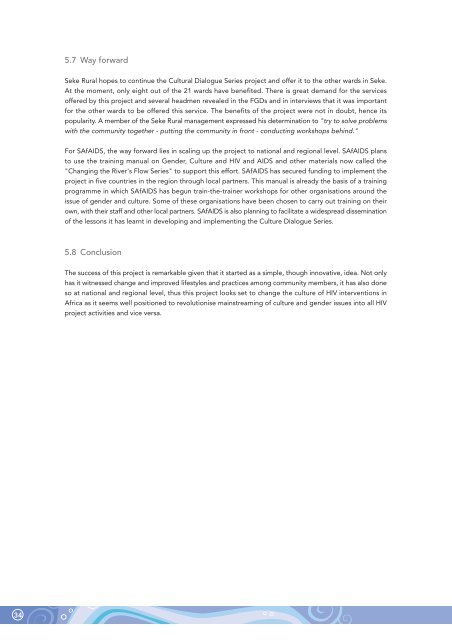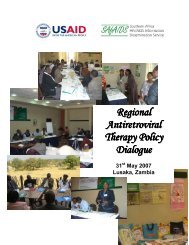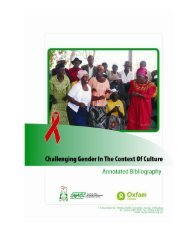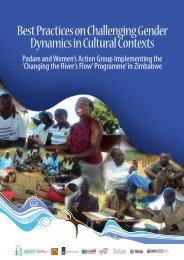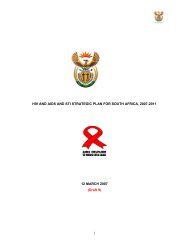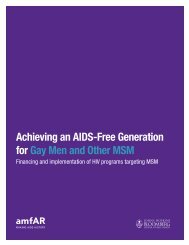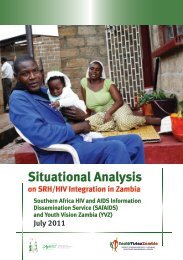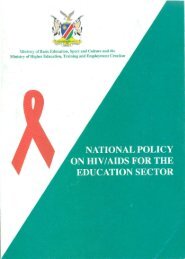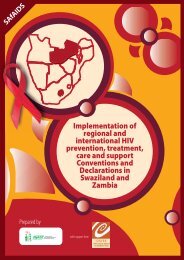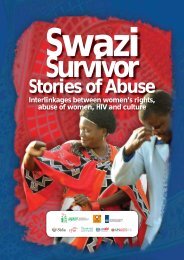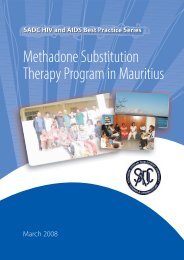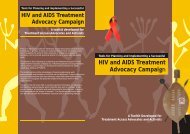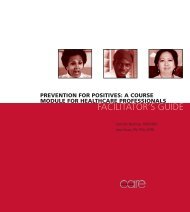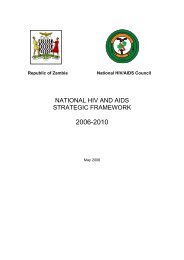5.6 Lessons learntThe richness <strong>of</strong> the project and successes gained have also brought to the fore critical learning points,which will add value to future planning <strong>of</strong> similar projects targeting communities using the dialogue seriesapproach.Some key lessons learnt:• Holding pre-project implementation consultative meetings with the community is critical. This processensures that community and target beneficiary needs are being met and project elements can berolled out in congruence with community needs and the environmental dynamics, rather than imposingthe project.• It was important to engage with the community leadership, who included chiefs, traditional healersand headmen. Without this initial and continued support, it seems unlikely that the project wouldhave been successful.• Working with partners who have a good reputation and who are able to conduct their activitiestransparently is key to the success <strong>of</strong> an intervention. The success <strong>of</strong> this project was due in part tothe fact that both <strong>SAfAIDS</strong> and Seke Rural were able to maintain their reputations as efficient, effectiveorganisations, exhibiting integrity in their practice.• Implementers need to leave behind their personal prejudices and keep an open mind. This was notonly an ethical requirement but also a practical consideration because, if the communities had suspectedthey were being manipulated, they would most likely have withdrawn their support. For example, animplementer might have personal views against polygamy, but would need to respect a chief whoinsists polygamy is a valid practice, but agrees to being tested, along with his wives. The implementerstherefore did not simply 'preach' to the community. They provided relevant, up-to-date informationand facilitated the community dialogues to enable community members to take this information,apply it to current cultural practice, and arrive at their own solutions.• Meeting separately with key players, such as the community leadership, followed by the women, thenthe men, and finally bringing them all together, was a vital strategy. It gave the women especially thespace to share their views and enabled a consensus <strong>of</strong> views from the men and women to be sharedwithout any one individual having to risk exposure.• It was important to avoid blame or siding with one group over another. Initially, both sexes tendedto blame each other. The Culture Dialogue Series was able to reduce this pattern by allowing bothsexes to hear the other side's grievances. It was also important for the success <strong>of</strong> the project that themen did not feel they were being singled out as the primary problem, or that their position in societywas being threatened.• The importance <strong>of</strong> documentation cannot be over-emphasised. The process <strong>of</strong> documenting thisproject allowed a feedback loop in which challenges, as well as windows for improved implementation,were immediately noticed and addressed. It also enables a more proactive approach to fundraisingfor project sustainability, and facilitates the replication <strong>of</strong> the project nation-wide.33
5.7 Way forwardSeke Rural hopes to continue the Cultural Dialogue Series project and <strong>of</strong>fer it to the other wards in Seke.At the moment, only eight out <strong>of</strong> the 21 wards have benefited. There is great demand for the services<strong>of</strong>fered by this project and several headmen revealed in the FGDs and in interviews that it was importantfor the other wards to be <strong>of</strong>fered this service. The benefits <strong>of</strong> the project were not in doubt, hence itspopularity. A member <strong>of</strong> the Seke Rural management expressed his determination to "try to solve problemswith the community together - putting the community in front - conducting workshops behind."For <strong>SAfAIDS</strong>, the way forward lies in scaling up the project to national and regional level. <strong>SAfAIDS</strong> plansto use the training manual on Gender, Culture and HIV and AIDS and other materials now called the"Changing the River's Flow Series" to support this effort. <strong>SAfAIDS</strong> has secured funding to implement theproject in five countries in the region through local partners. This manual is already the basis <strong>of</strong> a trainingprogramme in which <strong>SAfAIDS</strong> has begun train-the-trainer workshops for other organisations around theissue <strong>of</strong> gender and culture. Some <strong>of</strong> these organisations have been chosen to carry out training on theirown, with their staff and other local partners. <strong>SAfAIDS</strong> is also planning to facilitate a widespread dissemination<strong>of</strong> the lessons it has learnt in developing and implementing the Culture Dialogue Series.5.8 ConclusionThe success <strong>of</strong> this project is remarkable given that it started as a simple, though innovative, idea. Not onlyhas it witnessed change and improved lifestyles and practices among community members, it has also doneso at national and regional level, thus this project looks set to change the culture <strong>of</strong> HIV interventions inAfrica as it seems well positioned to revolutionise mainstreaming <strong>of</strong> culture and gender issues into all HIVproject activities and vice versa.34


